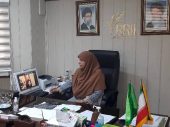Rice Research Institute of Iran (RRII) attended the 36th session of the Regional Conference for the Near East (Regional Stakeholder Dialogue- a virtual meeting)
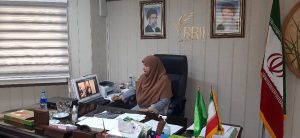 Dr. Maryam Hossieni Chaleshtori, Director-General of Rice Research Institute of Iran (RRII), and Dr. Shahram Mahmoud Soltani, Head of Scientific Relations and International Affairs of RRII attended the 36th session of Regional Conference for the Near East (Regional Stakeholder Dialogue) that was organized by Food and Agriculture Organization of the United Nations) was conducted online (Virtual Meeting) from 13 to 15 July 2021
Dr. Maryam Hossieni Chaleshtori, Director-General of Rice Research Institute of Iran (RRII), and Dr. Shahram Mahmoud Soltani, Head of Scientific Relations and International Affairs of RRII attended the 36th session of Regional Conference for the Near East (Regional Stakeholder Dialogue) that was organized by Food and Agriculture Organization of the United Nations) was conducted online (Virtual Meeting) from 13 to 15 July 2021
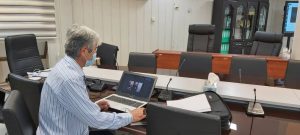 The motto of this virtual meeting was: Recover and Restart: Innovation four: Better, Greener and More Resilient Agri-Food Systems to Achieve the Sustainable Development Goals.
The motto of this virtual meeting was: Recover and Restart: Innovation four: Better, Greener and More Resilient Agri-Food Systems to Achieve the Sustainable Development Goals.
According to the FAO news website, Since February 2020, the world is experiencing what is probably the worst health and economic crisis of modern history. The COVID-19 pandemic has emphasized the vulnerabilities of our societies and the need for a radical review of our social and economic models. Central to this transformation will be the way we produce, process, distribute and consume food.
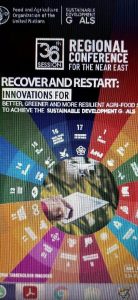 Starting in 2022, FAO is embarking on a new Strategic Framework that will guide its action in support of agri-food systems transformation in member countries. FAO’s Strategic Framework focuses on the transformation to MORE efficient, inclusive, resilient, and sustainable agri-food systems for better production, better nutrition, a better environment, and a better life, leaving no one behind.
Starting in 2022, FAO is embarking on a new Strategic Framework that will guide its action in support of agri-food systems transformation in member countries. FAO’s Strategic Framework focuses on the transformation to MORE efficient, inclusive, resilient, and sustainable agri-food systems for better production, better nutrition, a better environment, and a better life, leaving no one behind.
The four Betters represent an organizing principle for how FAO intends to support the achievement of the SDG Agenda and encourage a strategic and systems-oriented approach. Twenty Programme Priority Areas (PPAs) will shape FAO action in supporting countries to achieving the Sustainable Development Goals by 2030.
 In the Near East Region, the pre-COVID-19 situation of food security and sustainable agriculture was already critical in many ways, with some alarming trends that have only been exacerbated by the crisis: hunger was on the rise under the combined effects of crises, conflicts, and natural extreme events; inequalities were growing, in particular between rural and urban populations; natural resources were degraded and water scarcity was worsening due to demographic pressure and climate change, and changes in dietary habits led to unprecedented levels of overweight and obesity and to the exacerbation of non-communicable diseases.
In the Near East Region, the pre-COVID-19 situation of food security and sustainable agriculture was already critical in many ways, with some alarming trends that have only been exacerbated by the crisis: hunger was on the rise under the combined effects of crises, conflicts, and natural extreme events; inequalities were growing, in particular between rural and urban populations; natural resources were degraded and water scarcity was worsening due to demographic pressure and climate change, and changes in dietary habits led to unprecedented levels of overweight and obesity and to the exacerbation of non-communicable diseases.
 In line with the approach developed for FAO Strategic Framework, and considering regional specificities, four main priorities have been identified to transform the region’s agri-food systems, recover from the effects of the pandemic and contribute to the achievement of the SDGs. These four priorities focus on innovations and best practices for (i) Reducing the economic divide between urban and rural livelihoods through better rural employment opportunities, in particular for the youth and for women; (ii) Ensuring healthy diets for all in an increasingly urbanized region; (iii) Restoring environmental balance, with a focus on water scarcity, natural resources and climate action; and (iv) Building resilience against multiple shocks. Just as the challenges and risks facing food security, nutrition, and natural resources in the region are interrelated, priorities are also interdependent and interrelated, and they need to be addressed in an integrated manner.
In line with the approach developed for FAO Strategic Framework, and considering regional specificities, four main priorities have been identified to transform the region’s agri-food systems, recover from the effects of the pandemic and contribute to the achievement of the SDGs. These four priorities focus on innovations and best practices for (i) Reducing the economic divide between urban and rural livelihoods through better rural employment opportunities, in particular for the youth and for women; (ii) Ensuring healthy diets for all in an increasingly urbanized region; (iii) Restoring environmental balance, with a focus on water scarcity, natural resources and climate action; and (iv) Building resilience against multiple shocks. Just as the challenges and risks facing food security, nutrition, and natural resources in the region are interrelated, priorities are also interdependent and interrelated, and they need to be addressed in an integrated manner.
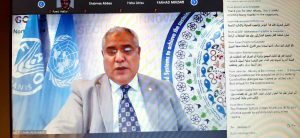 In preparation for the Regional Conference for the Near East which will take place in February 2022, the FAO Regional Office for the Near East and North Africa (NENA) convenes a regional stakeholder dialogue to engage in informal consultations with the Member States and stakeholders from the region so as to help shape the agenda of the Conference. This meeting is part of FAO efforts to strengthen the governance mechanism and ownership of the Organization’s activities in the region.
In preparation for the Regional Conference for the Near East which will take place in February 2022, the FAO Regional Office for the Near East and North Africa (NENA) convenes a regional stakeholder dialogue to engage in informal consultations with the Member States and stakeholders from the region so as to help shape the agenda of the Conference. This meeting is part of FAO efforts to strengthen the governance mechanism and ownership of the Organization’s activities in the region.
 The meeting will allow for substantive technical deliberations on the thematic and programmatic areas that are deemed important by Member States, in particular in relation with addressing the four regional priorities. Through this consultation countries and relevant stakeholders will be able to shape the agenda of the FAO Regional Conferences, focusing on salient priority issues and challenges.
The meeting will allow for substantive technical deliberations on the thematic and programmatic areas that are deemed important by Member States, in particular in relation with addressing the four regional priorities. Through this consultation countries and relevant stakeholders will be able to shape the agenda of the FAO Regional Conferences, focusing on salient priority issues and challenges.
The results of the meeting will be used to identify issues on which we wish to deliberate and will help define how the Member States, together with FAO and partner institutions, can collectively develop and implement a program to mitigate the impact of the COVID-19 pandemic on the countries of the region, build more resilient agri-food systems and ensure that their transformation paves the way towards achieving the Sustainable Development Goals by 2030.
Find attached for more information about the AGENDA, KEY SPEAKERS, INAUGURATION, and PRESENTATION TITLE.

